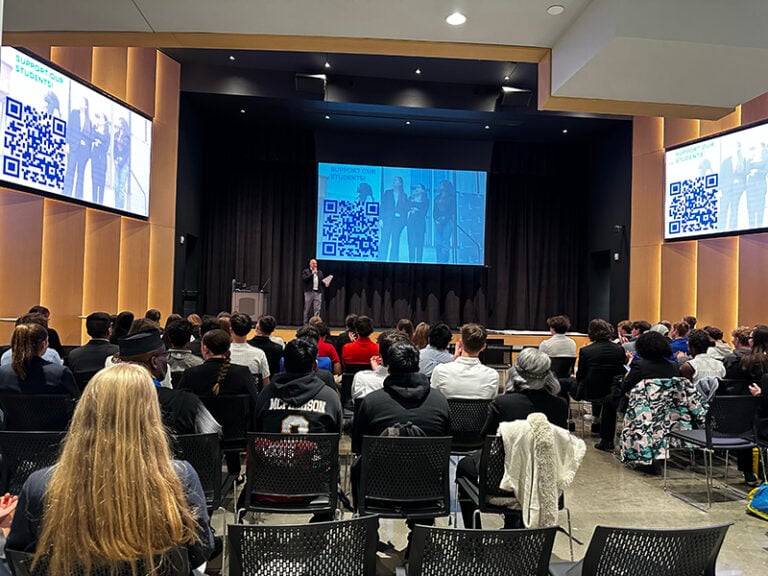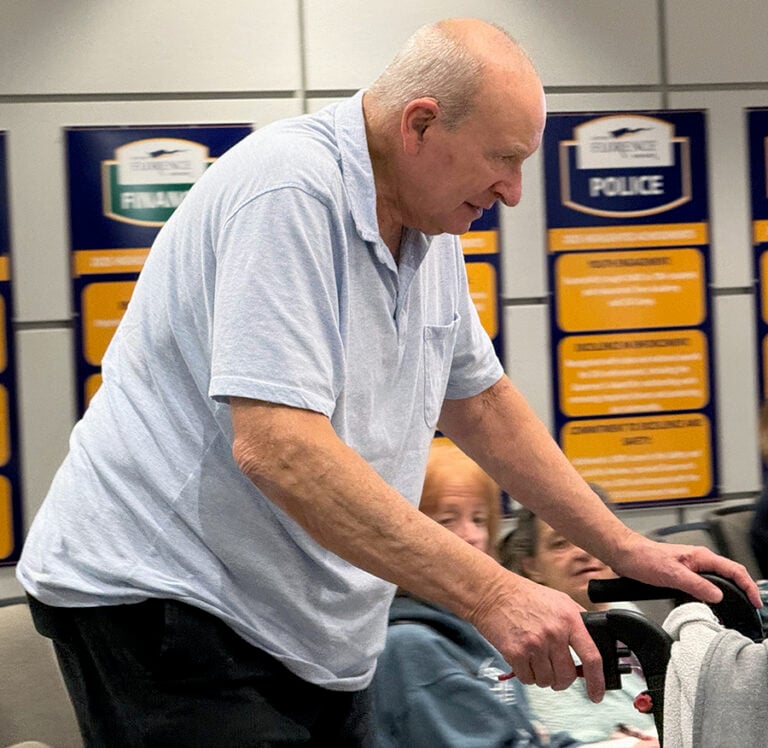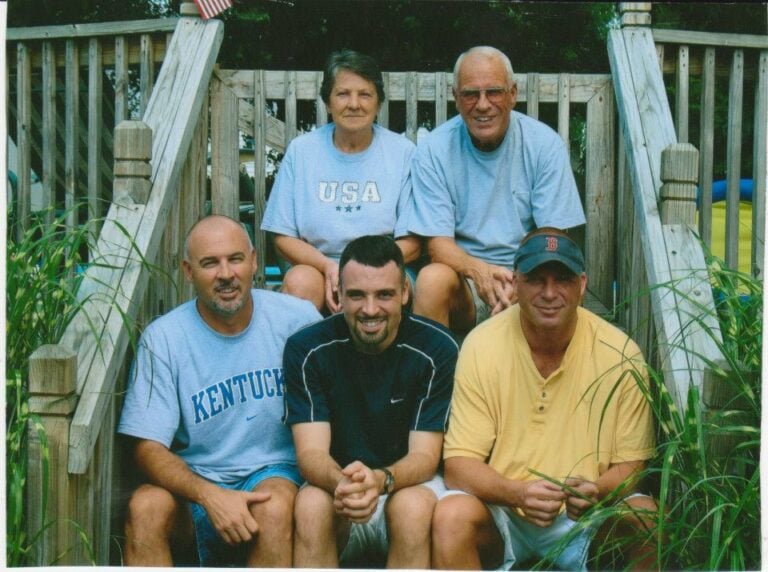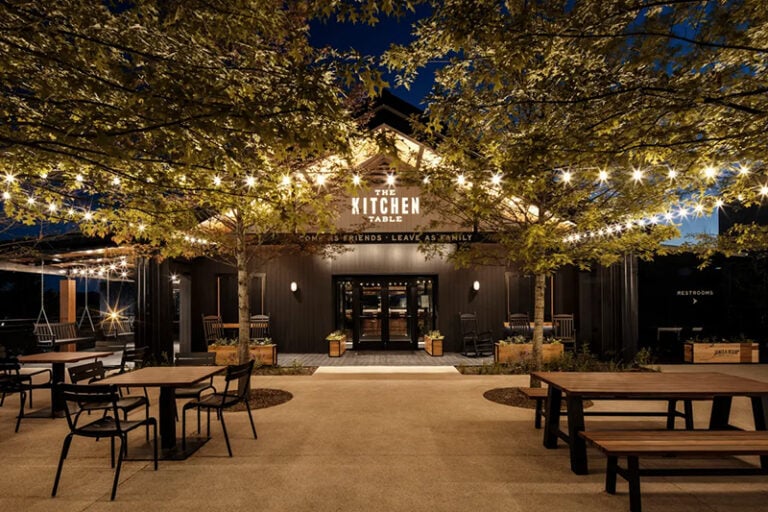
This past weekend most of us sat in front of the television and watched in horror the news of the deadly attack at the Pulse nightclub in Orlando, FL.
While watching survivors being interviewed I noticed when people are faced with a near-death experience some freeze in their tracks and succumb to their morality, while others just seem to have the resolve to survive.
I suspect that many of the victims were in a blind panic or psychological shutdown where they succumbed to the panic and stress to the point where they couldn’t react or respond. This paralysis is most likely brought on because of a lack of mental preparation to handle such an event.
The element of surprise is always the terrorist’s or mass shooter’s best weapon.
From the reports I have read it appears that when the Orlando shooter entered the club he had two choices –- turn left or turn right -– and he chose the larger room to his right, giving those to his left the opportunity for survival if they reacted quickly enough.
In such a situation fear and anxiety is what we must overcome to survive: Let your natural Jason Bourne instincts take over.
In the action-packed Jason Bourne movie series, despite the fact that the character is burdened with amnesia, he still possesses the natural instinct for survival which is ingrained into his psyche.
I do realize that not everybody has received the same training as this fictional character, but we all can do a better job paying particular attention to details and being more observant of our surroundings to improve our time to make an accurate threat assessment and react swiftly.
This is called “Situational Awareness,” and it is the ability to identify, process, and comprehend the critical elements of information about what is happening around you to make the best decision at that time, so that your reaction is more naturally instinctive and reflexive.
Our military, police officers and other emergency service personnel have good situational awareness skills and can even sometimes identify a threat before it becomes active. Have you noticed the behavior of a police officer or a war vet while eating?
Next time you get pulled over for a traffic stop notice the police officer’s eyes. While engaging you from your car window a police officer is not only listening to your answers -– but is studying your non-verbal behaviors, watching your hands, observing and cataloging information about passengers and whatever else is in the cab of your vehicle.
When the officer walks back to the car he/she will able to tell your approximate height, weight, color of eyes, clothing type, what you had in your backseat and where you may be hiding a firearm. I had one Officer notice in my wallet that I had a carry conceal permit and asked if I was armed; and all he obvserved was the white border of the permit sitting behind my driver license.
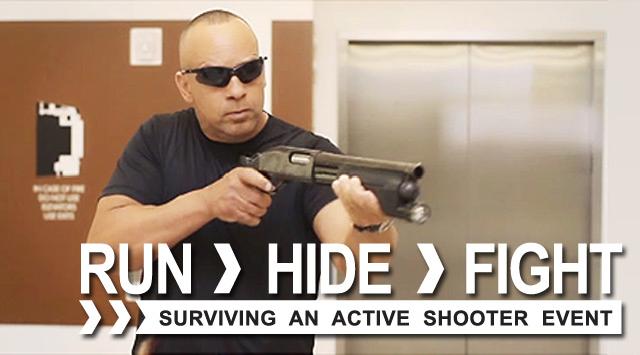
Just as weather conditions reflect a pending storm, there are usual telltale signs to help predict such events if you look close enough.
Police officers learn to trust their instincts by determining a baseline for normal behavior in a specific environment, so it becomes easier to spot anomalies before something bad happens.
Here are several Jason Bourne-type tips to help you survive an active shooting event: Become aware of the important elements in your environment. In one scene when Bourne walks into a restaurant he has already memorized the license plate numbers of 6 cars outside, notices the waitress is left-handed and a guy at the counter weighs approximately 250 pounds and that best place to look for a gun is in the cab of a truck parked outside. My point is wherever you are pay attention to everything and everybody, notice the location of every exit and if any of them are blocked or inoperable; and keep your head on a swivel.
Increase Your Odds: Immediately upon entering any public place that could be a soft target for a mass shooting, you need to scan the area and determine your exit strategy. Determine the best place to sit, stand or otherwise congregate that will give you the best advantage. Remember there is safety in numbers too, once a shooting begins join forces with others, as long as the group isn’t in an absolute panic. United we stand, divided we fall, especially if it comes to a “stand and fight” situation.
Be Prepared: If you live in a state that allows you to conceal a firearm and are comfortable with doing so, this is your most effective self-defensive measure to neutralize a threat and you keep you safe. If you don’t have a carry conceal, don’t feel comfortable or the venue doesn’t allow you to bring a carry conceal weapon this doesn’t mean you can’t prepared. Take the time to study the outline of your seating, bring a mini- flashlight, your cellphone and even a pocket knife if possible.
Trust Your Feelings: That gut feeling that things are not right is in instinctual. This clue is one of the most reliable because the body is able to detect stimulus long before we have consciously put it all together.
Bolt From Danger: When faced with an active shooter situation, the number one way to increase your survival is to flee immediately away from the threat. In the Jason Bourne movies you notice that despite the fact that Bourne is a trained assassin, his first instinct is flee the scene when danger presents itself. In one scene when attempting to escape from the embassy Jason Bourne, grabs an emergency map from the wall and then knocks out a soldier and removes his communications device, so that he can hear where the soldiers are to be able to make quick decisive decisions to enhance his escape.
Create A Distraction: If the opportunity presents itself to flee but you risk being seen you may want to consider creating a distraction that gives you that small window of opportunity. In a fight with another assassin, Bourne uses a shotgun to blow up a gas tank, creating a large smoke screen for cover. If you are in need of a distraction, maybe you can call the office down the hall on speaker phone to draw the shooter away.
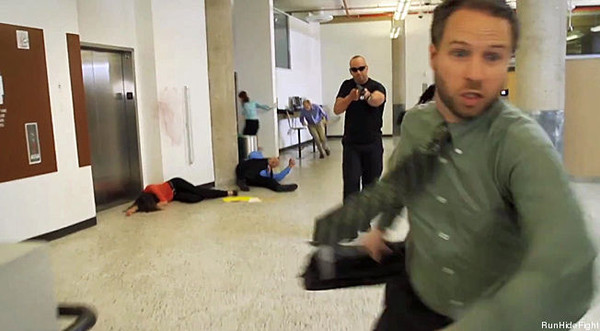
Hide: When fleeing isn’t an option Jason Bourne will hide from even a ledge several stories up. Develop some mad-like stealth-like ability. Wherever you chose to hide try to lock or block the door if possible, turn off the lights and anything that can draw attention to you such as a cellphone ringer. If possible preplan your hiding spot and if you are in an office environment, look to see if there is a credenza large enough to climb into, or possibly climbing up into the drop ceiling. In an active shooter situation, you are in a real life game of hide and seek where your life depends on it.
Call for Help: Jason Bourne never called 911 but that was because he couldn’t trust anybody, but you should. Don’t rely on others to call. You can provide crucial information such as the number of shooters, their description, type of weapons and their exact whereabouts.
Fight For Your Life: Jason Bourne is an expert of fighting based on his surroundings. In a high action fight in his apartment, he reaches around for a makeshift weapon of opportunity, settling on a ballpoint pen, which he uses to stab the assassin. Use your surroundings! Examples of weapons of opportunity can be a chair leg, eating utensils, fire extinguisher, stapler, umbrella, broken bottle…etc., and while you wait, mentally prepare yourself to attack. Terrorists and mass shooters are generally not trained fighters so your odds of survival increase if multiple people join forces.
The art of survival is not about being fearless, it’s about making a decision to live and doing whatever it takes to survive; because time doesn’t stand still and seconds may matter.
The difference between a survivor and a victim is that the survivor decides to be the victor against all odds and is not afraid to fail.
Be safe my friend & may God bless the family & friends of the Orlando victims.
Keven Moore works in risk management services. He has a bachelor’s degree from University of Kentucky, a master’s from Eastern Kentucky University and 25-plus years of experience in the safety and insurance profession. He lives in Lexington with his family and works out of both the Lexington and Northern Kentucky offices. Keven can be reached at kmoore@roeding.com.








